All herbs and spices provide beneficial compounds that have health advantages. In terms of treatment of diabetes, there are some incredible herbs that can help control blood sugar, lower cholesterol, improve insulin resistance and much more.
Although these herbs may be new to you, many of them have been used in alternative medicine practice for centuries. The natural remedies that people have relied on way before the introduction of pharmaceutical medications.
Below we cover the best herbs for diabetes control, especially those that can help lower blood sugar levels.
DISCLAIMER: The information provided below is for general informational purposes only and is not intended to be treated as medical advice. Please consult your doctor before commencing any supplementation.
Berberine
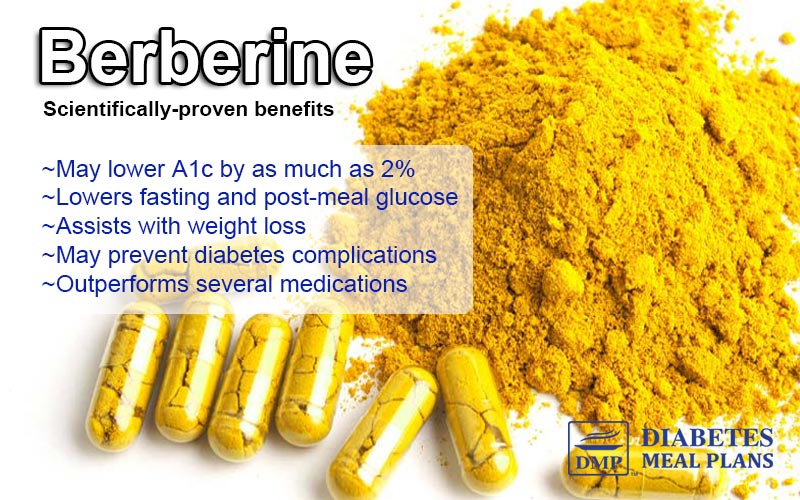
Berberine is an herb from India that has been utilised as medicine since ancient times. It is classified as an alkaloid, a type of compound that is known for its amazing ability to modulate and even reverse some the effects of type 2 diabetes mellitus and insulin resistance.
Berberine has been shown to directly increase insulin sensitivity by boosting the expression of insulin receptors on cells. It can also alter glucose metabolism in the body to fight hyperglycaemia.
Research
A 2018 literature review examining 28 clinical trials confirmed that berberine is effective for improving diabetes. The data showed that berberine treatment resulted in reduced fasting glucose, postprandial glucose, and HbA1c when compared to control groups.
Another study (2010) tested the blood sugar-lowering effects of berberine versus the most common diabetes medication, metformin. They found that 500mg of berberine (3 times/day) was just as effective at managing blood sugar as the same dose of metformin.
After 13 weeks of treatment, berberine lowered HbA1c by 1.99% while metformin lowered HbA1c by 1.43%. Fasting blood glucose levels also dropped by 68 mg/dL (3.8 mmol/L) with berberine compared to a 50.4 mg/dL (2.8 mmol/L) reduction with metformin.
Dosage
According to the research, berberine capsules are tolerated the best at a dosage of 500 mg, 3 times daily or you can reduce the dose to 300 mg, 3 times per day if stomach upsets occurs.
Rosemary
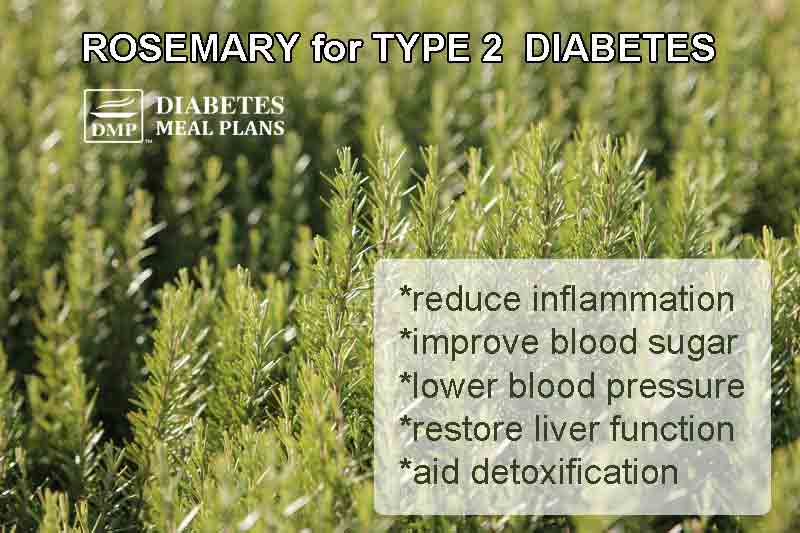
Rosemary is a fragrant, evergreen plant from the Mediterranean.
Rosmarinus officinalis (the scientific name for rosemary) contains many phytochemicals that fight against inflammation, oxidation, high blood sugar, and high blood pressure, as well as high levels of cholesterol and lipids.
In addition, these plant chemicals also protect and restore the liver, which results in better blood sugar regulation and improved detoxification.
Research
A comprehensive review of rosemary (2016) found that rosemary was able to reduce inflammatory markers associated with insulin resistance and obesity such as IL-6, TNF-alpha, and MCP-1.
The researchers also found that the supplementation of rosemary extracts was able to reduce blood pressure and prevent cardiac events in insulin-resistant animals.
Obese animals given a diet enriched with rosemary saw increased levels of adiponectin, a hormone that improves inflammation levels and insulin resistance, reduces triglyceride levels, and improves weight.
Dosage
Rosemary is versatile and can be taken as a supplement or oil, drank as a tea, or cooked into food. It is considered to be very safe by the FDA and is generally well tolerated at a reasonable dose of 4-6 g daily (or 2-4 mL of liquid daily).
Ginseng
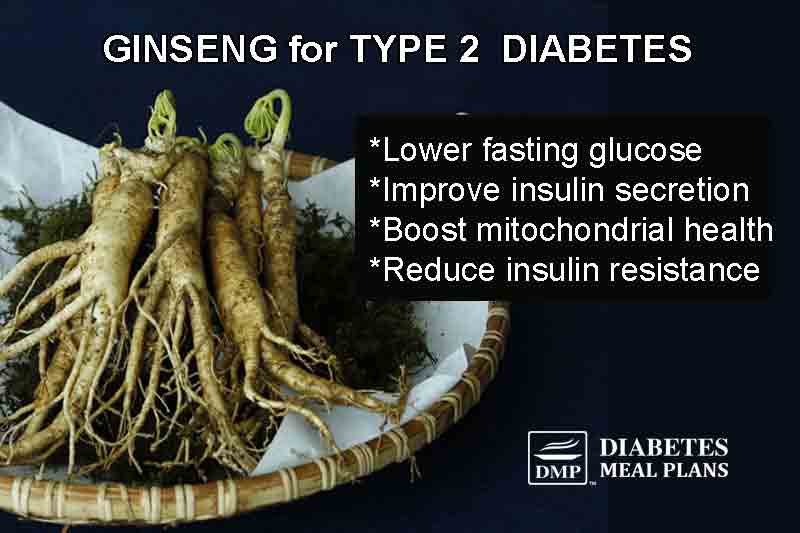
Ginseng is an herbal remedy used in traditional Chinese medicine that has been praised for its versatile uses from reducing stress to lowering high blood sugar and other parameters of diabetes.
Ginseng contains natural compounds called ginsenosides that are thought to improve chronic diseases by regulating inflammatory pathways in the body.
Research
One study (2018) found that ginseng had a major impact on the health of diabetic rats. After 12 weeks of supplementation (100 mg/kg) the rats had lower fasting glucose, insulin secretion, LDL cholesterol, and HbA1c levels. Their mitochondrial health and inflammation levels were also improved.
A 2016 review spanning 8 different human studies found that ginseng supplements improved blood sugar control by reducing fasting glucose, postprandial insulin, and HOMA-IR (insulin resistance) levels in type 2 diabetes patients.
Dosage
According to the research, ginseng is fine to take in relatively large doses for diabetes—anywhere from 1 to 6 grams per day is safe and effective.
Basil
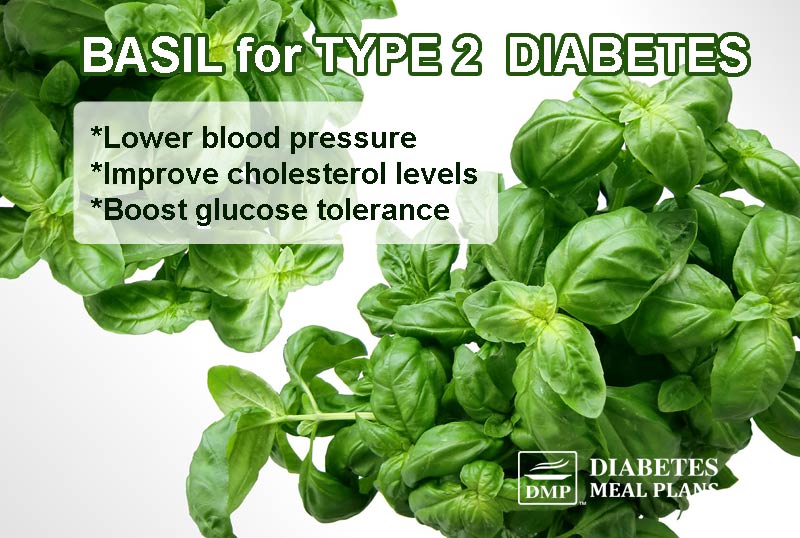
Basil, known scientifically as ocimum basilicum, may have a positive effect on blood pressure and cholesterol levels in those with diabetes.
Basil contains a chemical compound called eugenol that naturally lowers blood pressure by blocking calcium channels – this effect is also seen in other herbs and spices like cinnamon, clove, nutmeg, and bay leaf.
Research
A scientific review (2017) of clinical studies in natural blood pressure treatments showed that basil lowered systolic and diastolic blood pressure by 20 mmHg and 15 mmHg in animal models. In human models, a dose of 30 mg/kg was effective at reducing blood pressure, although the effect seen in this study was not long-lasting.
A study (2017) on diabetic rats revealed that a 28-day course of basil extract had a significant impact on several parameters relating to diabetes. Blood cholesterol and triglyceride levels were reduced by 19.3% and 39.54%, respectively, compared a 2.6% cholesterol reduction in rats treated with metformin. The basil treatment also produced an increase in oral glucose tolerance.
Dosage
Up to 2.5 g of basil can be taken daily and it is most effective when taken on an empty stomach.
Gymnema Sylvestre
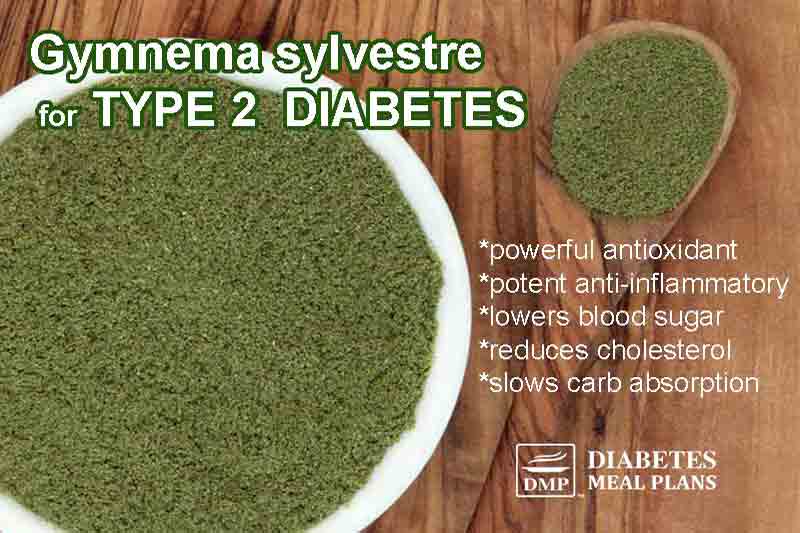
Gymnema sylvestre is a triple-threat when it comes to managing diabetes—it smothers inflammation, reduces bad cholesterol, and brings down high blood sugar levels.
This Indian herb is highly effective due to it’s anti-inflammatory and anti-oxidant properties. In addition, a natural compound called gymnemic acid blocks some glucose from being absorbed after eating which prevents post-prandial hyperglycemia.
Research
A 2015 study demonstrated the powerful effects that gymnema sylvestre can have on cholesterol and glucose levels in people with type 2 diabetes. A 30-day trial of gymnema sylvestre supplementation (1 g, taken twice daily) resulted in reduced levels of glucose (-37%), triglycerides (-5%), total cholesterol (-13%), and LDL cholesterol (-19%).
In a 2017 study, metabolic syndrome patients that received a daily dose of 300 mg before breakfast and dinner for a total of 12 weeks had significant decreases in body weight, body mass index, and VLDL “bad cholesterol” levels.
Gymnema sylverstre has also been shown to reduce inflammation and oxidation markers in diabetic rats.
Dosage
Gymnema sylvestre is most often taken as a capsule supplement at a dose of 200-400 mg daily. It may be more effective when the broken up into separate doses throughout the day, or if you struggle with high blood sugar after meals, it can be taken right before a meal.
Milk Thistle
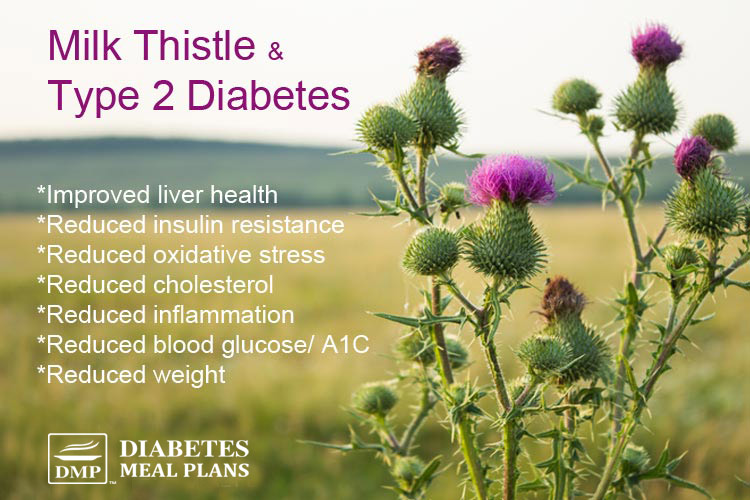
Milk thistle is a plant commonly used in naturopathic medicine that provides many health benefits for anyone struggling with blood sugar dysregulation or insulin resistance.
The main component in milk thistle responsible for the health-boosting effects is called silybum (or silymarin).
This compound can restore and protect liver cells, which has a huge role in diabetes since the liver directs the storage and use of glucose in the body. The liver is also in charge of filtering toxins out of the body, which has an effect on systemic inflammation.
Research
A 2018 study found that people with diabetes who received a silymarin extract (140 mg, taken 3 times daily) for 45 days had significant reductions in their fasting blood sugar (-11.01%), serum insulin (-14.35%), insulin resistance scores (-29.52%), triglycerides (-23.7%), and triglyceride to HDL cholesterol ratio (-27.67%) when compared to the placebo group.
Another study (2018) showed that milk thistle extract may have a therapeutic effect on those with metabolic syndrome as milk thistle alters glucose-regulating hormones like adiponectin.
Dosage
Milk thistle can be taken as a supplement capsule, consumed as a liquid tincture/extract, or enjoyed as a hot cup of tea. A dose anywhere from 140 mg several times a day to up to 600 mg once per day is a good starting place.
Conclusion
As you can see, research shows that herbs can make a great addition to your diabetes treatment.
However, it is never a good idea to take every single herb and supplement you can. It’s always best to try one thing, see how your body reacts, then introduce something else or another agent in combination.
IMPORTANT: The above information shares the facts based on research and is for informational purposes only. Always consult your doctor before starting any dietary supplements. And work with your healthcare team on which ones may suit you best and the recommended dosage to suit your needs.
And remember, herbs are just an aid that can help you achieve better diabetes goals. The most important factor is always the same: what you eat!
If you get your diet right, most of the time everything else falls into place.

